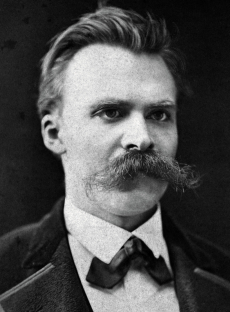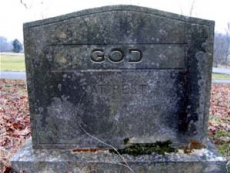
Friedrich Wilhelm Nietzsche (15 October 1844 – 25 August 1900) was a German philosopher, cultural critic, poet, and Latin and Greek scholar. One strand of his philosophy was his atheist critique of religion and of Christianity in particular. He believed that it encouraged a ‘slave morality’, encouraging weakness and subservience, and leading to cultural decline. The most famous of his statements on religious was that “God is dead.”
Nietzsche first made the controversial claim in his 1882 book Die fröhliche Wissenschaft, literally 'The Joyful Science' but commonly given as The Gay Science. In Section 108, 'The New Struggles' he claims:
After Buddha was dead, people showed his shadow for centuries afterwards in a cave,—an immense frightful shadow. God is dead: but as the human race is constituted, there will perhaps be caves for millenniums yet, in which people will show his shadow.—And we—we have still to overcome his shadow!
This means that although God is dead, people will have a hard time accepting it. Despite Nietzsche’s convictions, religion will continue at least in some form for quite some time. In Section 125, ‘The Madman’, he has the titular character run through a village square exclaiming:
God is dead. God remains dead. And we have killed him. How shall we comfort ourselves, the murderers of all murderers? What was holiest and mightiest of all that the world has yet owned has bled to death under our knives: who will wipe this blood off us? What water is there for us to clean ourselves? What festivals of atonement, what sacred games shall we have to invent? Is not the greatness of this deed too great for us? Must we ourselves not become gods simply to appear worthy of it?

The line “we have killed him” reveals what Nietzsche’s real meaning was in the statement. He didn’t believe that there had been a literal God who had been slaughtered. Instead, he thought that in the modern world the Christian God no longer provided a credible source of morals or a pattern by which to live one’s life. The string of questions the madman asks reflects the ensuing crisis. As Nietzsche says:
When one gives up the Christian faith, one pulls the right to Christian morality out from under one's feet. This morality is by no means self-evident... By breaking one main concept out of Christianity, the faith in God, one breaks the whole: nothing necessary remains in one's hands.
The hole left by God’s death, and by extension the whole system of Christian beliefs, raises the problem of how to live your life without the divine commandments. Nietzsche believed that this would lead to nihilism, or the belief that nothing has any inherent value and that life lacks any purpose. However, he strove to find a solution to this problem by re-evaluating the foundation of human values, going deeper than Christianity. He believed that by putting aside the idea of God humans could fully develop their creative powers: by turning away from the supernatural they could come to appreciate the value of the world.
Images: https://upload.wikimedia.org/wikipedia/commons/1/1b/Nietzsche187a.jpg
https://totallybaked.files.wordpress.com/2006/12/godstone2.jpg

0 Comment:
Be the first one to comment on this article.